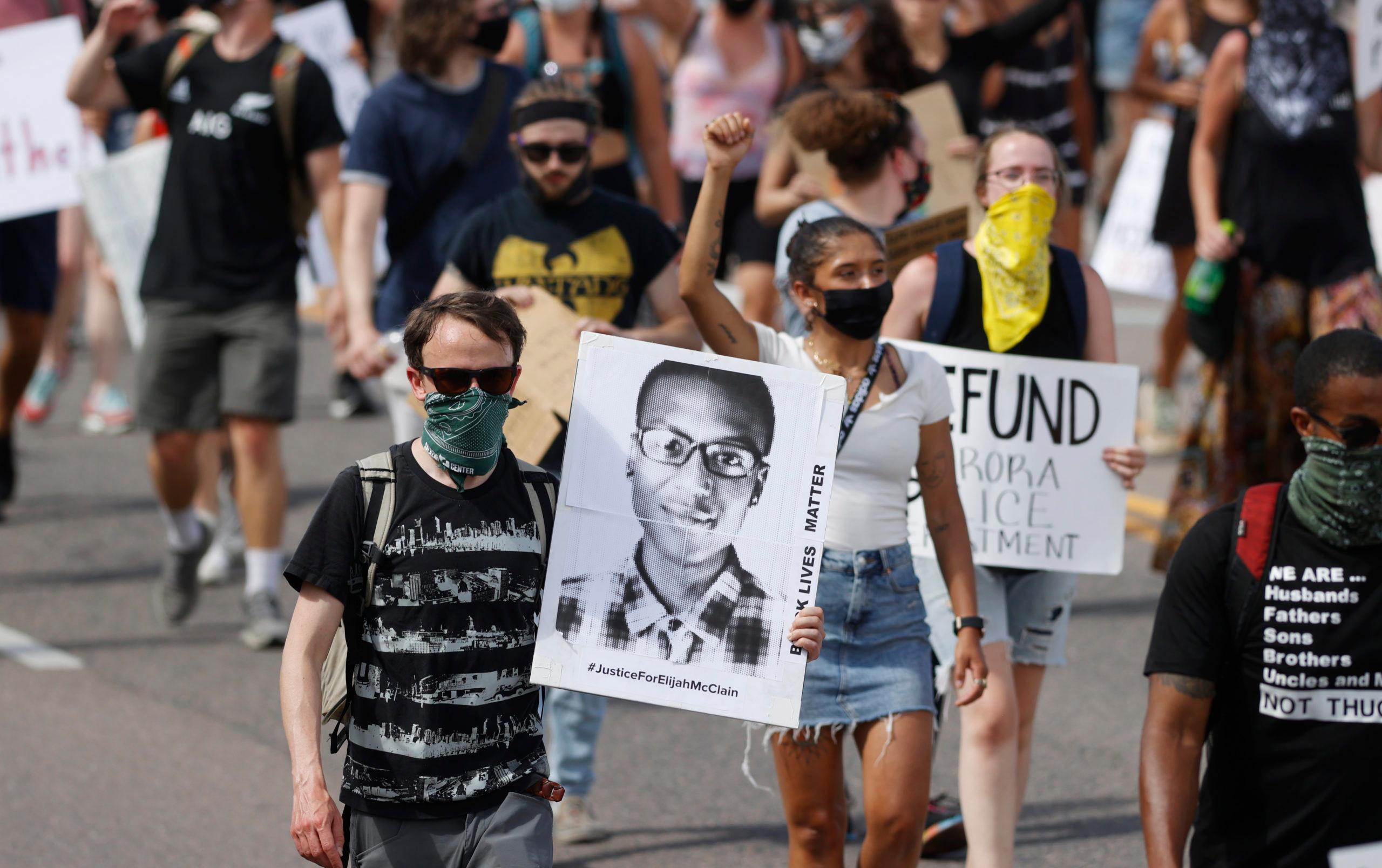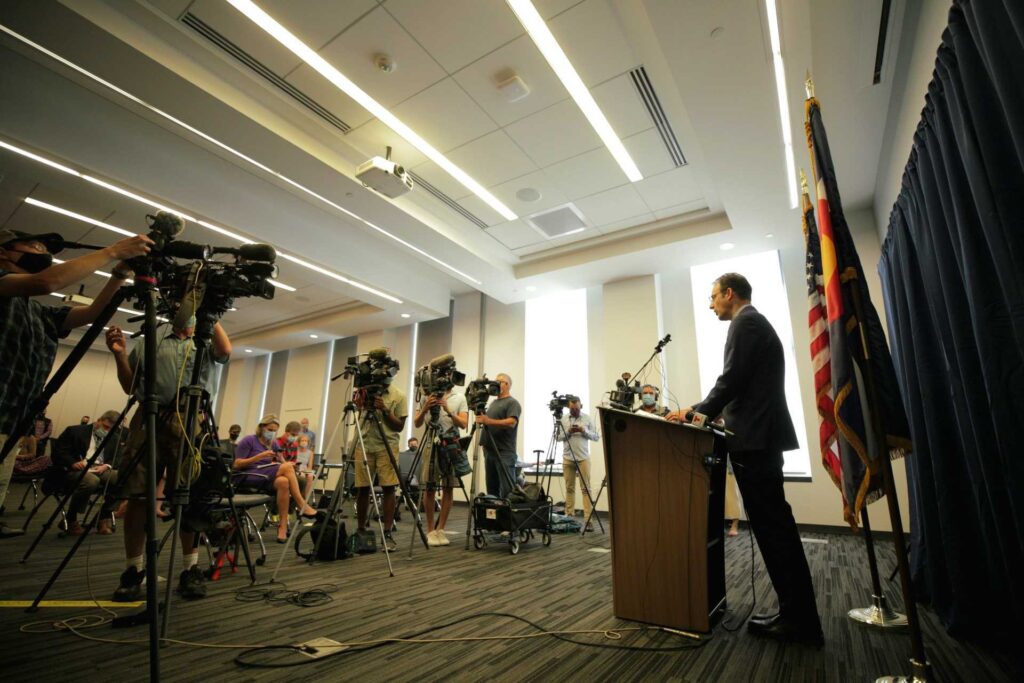
Updated September 2, 2021 at 8:35 a.m.
A grand jury has filed a total of 32 criminal charges against three Aurora Police officers and two paramedics, including manslaughter and criminally negligent homicide, for their role in the deadly detention of Elijah McClain in 2019.
In addition, officers Nathan Woodyard and Randy Roedema, former officer Jason Rosenblatt and paramedics Jeremy Cooper and Peter Cichuniec also face crime of violence and assault charges. The 32 count indictment was filed in Adams County District Court on Tuesday. All five turned themselves into the Glendale Police Department late Wednesday night, and they were each released after posting a $10,000 bond.
In a press conference announcing the indictments, state Attorney General Phil Weiser said he didn’t seek out this investigation, but was asked to conduct it last summer by Gov. Jared Polis.
That request came after the Aurora Police did their own investigation and the Adams County District Attorney declined to file charges against any officers shortly after McClain’s death in 2019.
“As you know there was an initial investigation into McClain's death, which was limited,” Weiser said. “Whenever a person dies after an encounter with law enforcement the community deserves a thorough investigation, Mr. McClain’s family deserves it and justice requires it.”

McClain’s mother, Sheneen, has been calling for criminal charges against the officers since the beginning.
In an interview with CPR News ahead of the anniversary of her son’s death, McClain said she wanted them to go to prison.
“I hope they get life in prison. To be honest with you, Elijah lost his life,” she said. “You know, he didn't grow up being a gang member, robbing banks. He didn't grow up being a problem to anybody. He was living his life in the most peaceful way he possibly could.”
Weiser said on Tuesday that in the initial months of looking into what happened, it became clear that he needed to convene a statewide grand jury to help compel testimony and interviews and obtain information that he wouldn’t otherwise be able to get through the regular investigative process.
The pandemic delayed that process, preventing the the grand jury from meeting during much of 2020. Weiser said they started their investigation into the death in January 2021.
They met weekly all the way up through last Thursday when they finished the investigation, Weiser said, however he delayed announcing their verdict while he reached out to McClain’s family and the men under indictment.
“We appreciate the public’s patience as we conducted and continued to conduct our work,” he said.
The indictments are allegations and officers still have due process in court.
“Our goal is to seek justice for Elijah McClain, for his family and friends and for our state. In so doing, we advance the rule of law and the commitment that everyone is accountable and equal under the law,” Weiser said. “We want you to understand that we are limited in what we can say and we'll do our talking in court.”
The Aurora Police Association condemned the news of the officers’ indictment in a Facebook post shortly after the announcement.
“Immediately after Elijah McClain's death, then Aurora Police Department Chief Nick Metz stated clearly that Mr. McClain was not murdered by Aurora Police Department officers. Nothing has changed. Our officers did nothing wrong,” read the union statement. "The hysterical overreaction to this case has severely damaged the police department. Inevitably, the public are the ones who've paid the price.”
Adams County investigation originally cleared officers
The criminal indictment on Tuesday is a direct reversal of a local decision made by then Adams County District Attorney Dave Young, who declined to file charges in 2019 even though he called the incident preventable.
At the time, Young said there was not enough evidence, beyond a reasonable doubt, that the use of force applied to McClain was not justified under Colorado law.
Young also pointed out in his letter that a contractor pathologist for Adam’s County found that McClain’s cause of death was “undetermined” -- rather than a homicide, a suicide, an accident or from natural causes. A CPR News investigation also found that officers from Aurora were present during the autopsy and in contact with the coroner.
That lack of certainty led Young not to file any charges against the cops, he said.
“Ultimately, while I may share the vast public opinion that Elijah McClain’s death could have been avoided, it is not my role to file criminal charges based on opinion,” Young said. “But, rather, on the evidence revealed from the investigation and applicable Colorado law.”
Two years ago, McClain, 23, was walking back from an Aurora convenience store when someone called the police and said he was allegedly acting suspiciously. He was wearing a mask and dressed warmly on a summer day and waving his hands in the air.
Officers Woodyard, Rosenblatt and Roedema tried to question him and the exchange quickly escalated when officers say McClain resisted commands.
McClain told police he didn’t have a gun and that he preferred personal space, according to a tape of the incident.
Officers eventually placed McClain in a carotid chokehold, a tactic which is now banned in Colorado. He briefly passed out and also vomited a couple of times. Paramedics injected McClain with ketamine and he went into cardiac arrest while being transported to the hospital. He died several days later after doctors declared him brain dead.
McClain's death garnered national attention and was the focus of several investigations
McClain, who was Black and a massage therapist in Greenwood Village, was not suspected of committing any crime. He was described as a slight, gentle man who became a vegetarian because he didn’t like to eat animals.
Two of the three officers —Woodyard and Roedema— as of Tuesday still worked for Aurora Police.
Rosenblatt was fired from the force last summer after he responded inappropriately to a photo that was texted to him of other Aurora officers seemingly poking fun of McClain’s death.
McClain’s death didn’t receive a lot of attention until the death of George Floyd last summer and the revitalized movement against police violence — particularly against Black Americans.
McClain’s mother, Sheneen, said during the protests over Floyd’s death a GoFundMe she set up to help with funeral expenses grew to more than $2 million and people around the world reached out to her expressing outrage about her son’s death.
A Change.org petition garnered more than 2 million signatures and counting from people across the country — including high-profile athletes and politicians. City officials throughout Aurora have received thousands of calls and emails about the case.
Several investigations were launched last summer — including a federal probe into whether the officers violated federal code by taking advantage of their power while in uniform. Weiser launched an investigation into the Aurora Police Department and the Aurora City Council hired several outside investigators to look into patterns and data among officers.
One investigator found the agency critically mishandled the investigation. Another outside expert gave more than 50 recommendations to Aurora City Council about how the department could improve use of force techniques and transparency, among other things.
McClain’s death also helped inspire Colorado’s new police accountability law, which makes it easier for civilians to sue officers, puts limits on when officers can use force and bans chokeholds.
This story is developing and will be updated.
- ‘I’ll Fight For The Rest Of My Life’: Elijah McClain’s Mother Reflects On Two Years Since His Death
- Watchdog Group: Aurora Police Department Needs To Improve Use-Of-Force Training, Hiring And Data Collection
- An Independent Investigation Released Earlier This Year Found That Police Mishandled Its Interaction With Elijah McClain (via Denverite)








